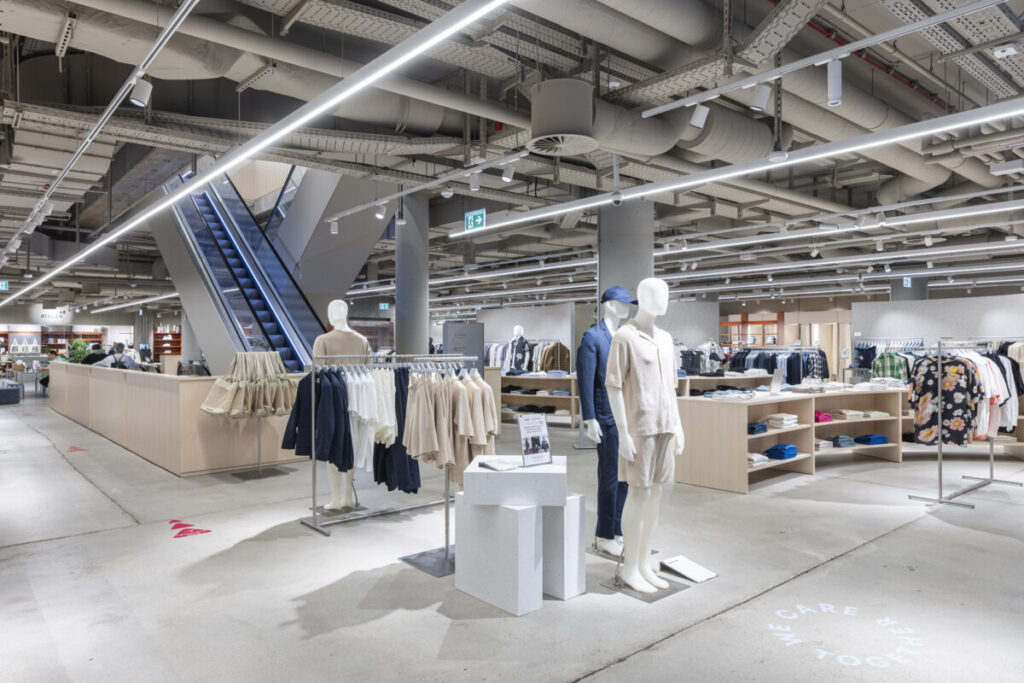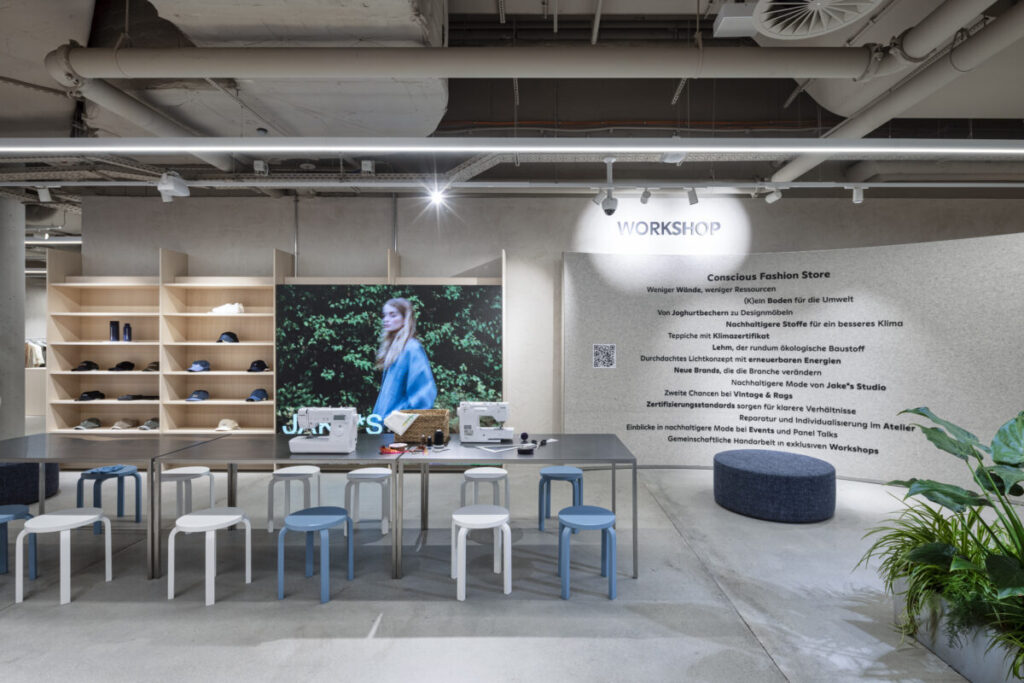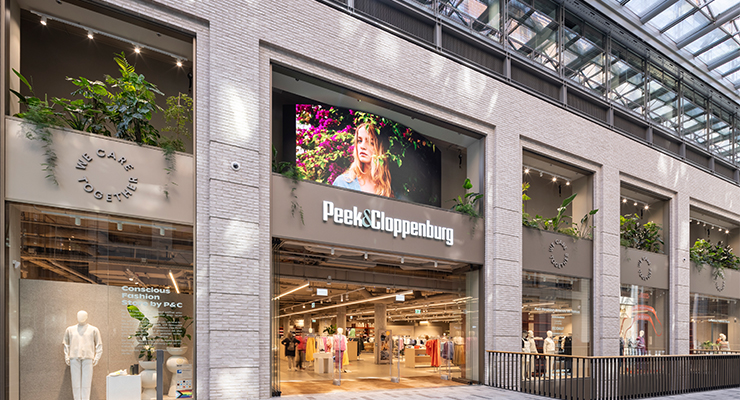ACROSS: WHAT IS THE BASIC CONCEPT BEHIND THE CONSCIOUS FASHION STORE?
THIMO SCHWENZFEIER: The topic of sustainability still poses major challenges for the fashion industry, which we are aware of. With our ambition to become a little better every day, the opening of the P&C* Conscious Fashion Store is, therefore, an important step on our sustainability journey. The more important aspect is that the economic sector has realized that many sustainable production processes serve business purposes. P&C* has united all of the Groups’ sustainability initiatives under the “We Care Together” communicative umbrella. The basic idea was not to present the topic of sustainability in the stores as a small green island, but P&C* wanted to show that a coherent, sustainable retail scenario could be implemented successfully. The result is the Conscious Fashion Store.
ACROSS: DO CUSTOMERS FIND CONVENTIONAL BRANDS WITH SUSTAINABLE COLLECTIONS OR ONLY SUSTAINABLE BRANDS?
SCHWENZFEIER: Both. We have decidedly sustainable labels in our range that are either fair fashion brands or certified. Examples include Armed Angels and Ecoalf. We currently have 17 brands that are part of the so-called fair spectrum. In addition, we also have products from conventional brands that are in a transformational phase due to our long-standing business relationships and experience in central purchasing; this refers to brands that fulfil more sustainable aspects with individual lines or capsules than with their main collections, e.g., Marc O’Polo. Jakes Studio, our own brand, focussed on the use of more sustainable materials and awareness and responsibility in every action. Of course, Jakes Studio is represented accordingly in our Conscious Fashion Store.
ACROSS: SO, YOU ARE NOT A SUSTAINABLE STORE, BUT YOU SHOW THE WAY TO SUSTAINABILITY.
SCHWENZFEIER: We talk about selling more sustainable products. The right language is crucial. We want to transparently demonstrate and communicate a path to greater sustainability. You have to make sure you take customers and brands with you, so it’s good that our store doesn’t just offer a sustainable niche. Many structures in clothing production are not easy to break down, so it is all the more important to support companies that want to do this and offer them a platform along the way. Our manifest, which hangs on the wall in our store, sums up these thoughts well. It contains one important sentence: “Not perfect, but better every day.”
ACROSS: HOW DOES THE STORE DESIGN REFLECT THE THEME OF SUSTAINABILITY?
SCHWENZFEIER: When designing the concept, we followed the architecture of omission. We took over the store and left it in its raw state, apart from some paint on the walls. We didn’t install ceilings, seal the floor, or paint over the construction site markings on the pillars. The aim was to use as few resources as possible. Our furniture is either made from recycled materials or, like our wooden shelves and wooden tables, from certified materials and renewable raw materials. Other smaller pieces of furniture, for example, on which we display shoes, are made from recycled yogurt pots. Mannequins that present the goods have been produced using a 3D printing process, which also saves resources. There are a whole host of details that make up the overall concept.
ACROSS: HOW MUCH HAS THE STORE’S DESIGN CHANGED SINCE IT OPENED?
SCHWENZFEIER: More and more is being added as we go along. We have recently started working with the recycling service provider Texaid so that we can also collect discarded clothing. This box is also made from FSC-certified wood. The lighting, however, was entirely LED-based right from the start. The store covers 3,000 square meters of sales space over three levels. Each level has at least one plant island with natural plants. These are illuminated to give them a sun effect. Seeing how the plants that were planted in May last year have developed is a pleasure. You have to remember that we are still in a shopping center here. Of course, this is a subjective feeling, but customers tell us the air is much better here. We have an employee who can take care of the plants in addition to his duties, because he has a green thumb, which is, of course, very fortunate.
ACROSS: THE IDEA IS TO ENCOURAGE COMMUNICATION.
SCHWENZFEIER: Absolutely, there are many visible themes in the store, but there is also a lot that only becomes visible at the third or fourth glance. We want to talk to customers about all of this – even if it’s about plant care. We often have visitors from competitors, and we like to show them around the store. Sustainability requires a partnership approach. That’s why we aim to show how we do things and use others as inspiration.


ACROSS: WHAT TOOLS DO YOU USE TO EXPLAIN ALL OF THIS TO YOUR CUSTOMERS?
SCHWENZFEIER: Presently, traditional materials are still in the background. The walls are not covered with QR codes or explanations. We don’t want to overwhelm anybody. We are primarily a P&C* Düsseldorf store. The customers who come to us may not even know what “conscious” or “sustainability” means. Still, they want to buy beautiful clothes and to enjoy a store that is simply different and offers a different experience. The garments have tags attached from the “We Care Together” initiative, which customers can use to learn more about the production processes or materials used. The labels themselves often do something similar.
ACROSS: WHAT ROLE DO WORKSHOPS OR EVENTS PLAY?
SCHWENZFEIER: This is where the majority of our educational work takes place. We have a space directly adjacent to our studio that we can permanently use as a workshop area. For example, workshops for five to 25 people on upcycling, textile care, or zero waste occur here. For this, we bring in speakers such as designers from Berlin who are experts in their respective fields. We provide them with space and materials, so the designers can engage with customers and their communities.
ACROSS: ARE THERE ANY COLLABORATIONS WITH OTHER COMPANIES?
SCHWENZFEIER: For example, we recently had a machine manufacturer in the store who explained why a 30-degree wash without fabric softener is perfectly adequate for today’s textile fibers. In our educational work, we focus on dialogue rather than on large poster campaigns.
Our panel talks, which we usually organize in cooperation with NGOs, also reflect this approach. The largest event to date, with 70 people, was a film screening at which we showed a film by a female filmmaker from Bangladesh about the production conditions of sewists in Bangladesh, Sri Lanka, and Vietnam. We have an exhibition area for sneakers on the ground floor for larger events, which we can quickly convert to a stage. These events are attended by guests who come to the store, especially for the event, and by many customers who happen to be in the store and stop by to take part.
ACROSS: DOES THE STORE MAKE MONEY FROM THIS?
SCHWENZFEIER: We don’t charge admission or bill the companies that present themselves at the store. We are still trying out many formats and seeing how customers receive them. We deliberately want to be a test laboratory. This is in the nature of things when a concept is launched on the market for the first time. We intend to take other companies with us without significant hurdles, because, as with sustainability, the common duty to provide information is more important than economic competition. However – and this is crucial – we are part of the standard P&C* Düsseldorf store network and have the same processes and KPIs as all the other branches. We also have to sell; we are not a luxury that the group allows itself.
ACROSS: HOW IMPORTANT IS THE FIRST CONSCIOUS FASHION STORE’S LOCATION IN A CENTER LIKE THE PLAYCE, WHICH FOCUSES ON EXPERIENCE AND LEISURE AS ITS OVERALL ORIENTATION?
SCHWENZFEIER: The unique location and utilization concept of The Playce in the heart of Berlin was undoubtedly an essential anchor for this first opening, as we can show more clearly that we function differently from other stores. But, this is more of an attention-grabbing effect. I don’t think we need an environment that is exclusively home to particular concepts. We want to be a successful and experience-driven store, and we won’t be successful just because we are in a unique location. We will be successful if we perform in the relevant retail locations at least as well as the average.
*There are two independent Peek & Cloppenburg companies with their headquarters in Düsseldorf and Hamburg. This information relates to Peek & Cloppenburg B.V. & Co. KG, Düsseldorf, whose store locations can be found at www.peek-cloppenburg.de/stores.

Thimo Schwenzfeier
Thimo Schwenzfeier is the General Sales Manager of the Conscious Fashion Store of Peek & Cloppenburg* B.V. & Co. KG, Düsseldorf.






